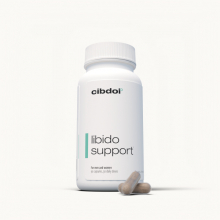What hormone causes horniness?
Published:
Feeling frisky? There's a complex hormonal dance that regulates your libido. Let's explore what hormone causes horniness and other factors that can leave you longing for love.
Contents:
- What is testosterone?
- How does testosterone regulate libido?
- How can I increase my testosterone?
- What other factors influence libido?
- Common causes of low libido
- When to see a doctor
- Summary
- Frequently Asked Questions About What Hormone Causes Horniness
- What is the main hormone that controls libido?
- How exactly does testosterone increase sex drive?
- Do women have testosterone too?
- What other hormones impact sex drive?
- What lifestyle factors increase testosterone?
- What health conditions can lower libido?
- Why does testosterone decline with age?
- What are symptoms of low testosterone?
- How do doctors treat low testosterone?
- Are testosterone boosters effective?
- What should I do if I have persistent low libido?
Have you ever wondered what makes you feel turned on? That racing heartbeat, flushing skin and overall feeling of arousal is controlled by your hormones. Hormones are powerful chemical messengers that regulate many bodily functions. From growth and development to hunger, sleep and sex drive, hormones influence how you feel and behave.

So what exactly causes the longing for love and lust? What hormone triggers that passionate, pleasure-seeking part of you?
The short answer: testosterone. This vital male sex hormone fuels your sex drive and sparks sensual desires. But hormones don't work alone. Your brain, environment, health and relationship can all impact your randy mood too.
Let's delve into the science of sexual chemistry and unpack what drives your desire. Here’s everything you need to know about the hormones, brain chemistry and other factors that control your sex drive.
What is testosterone?
Testosterone is the primary male sex hormone. Although both men and women produce testosterone, males generate much more. And testosterone levels are nearly 15 times higher in men than women.
This powerful hormone has several important functions in the male body, like:
- Regulating sex drive (libido)
- Controlling features of masculinity
- Building muscle mass and strength
- Stimulating sperm production
- Distributing fat
- Promoting bone density and strength
Testosterone also fuels the changes seen in male puberty like growth of body hair, deepening of the voice and increase in penis and testes size.
As a sex hormone, testosterone directly controls your sexual desire. It’s what makes you feel turned on and want sexual activity. The higher your T levels, the stronger your sex drive may be.
How does testosterone regulate libido?
Now you know testosterone is the key hormone that regulates sexual desire and arousal. But how exactly does it work?
Testosterone controls your libido through the hypothalamus and pituitary gland in the brain.
The hypothalamus is the control center for hormones and the pituitary gland tells your testes to produce testosterone. Here’s the step-by-step process:
- The hypothalamus senses you need more testosterone and releases gonadotropin-releasing hormone (GnRH).
- GnRH signals the pituitary gland to release luteinizing hormone (LH) and follicle stimulating hormone (FSH).
- LH tells your testes to produce more testosterone.
- Your testosterone levels rise, fueling your libido and causing arousal.
This complex chain reaction regulating testosterone synthesis happens continuously. Your brain detects when testosterone gets low and releases hormones to spike production back up.
How can I increase my testosterone?
As you age, testosterone synthesis starts declining after 30. But you can give your T levels a natural lift through lifestyle habits like:
- Strength training - Lifting weights triggers testosterone release. Focus on compound moves like squats, deadlifts and bench presses.
- High-intensity interval training - Short bursts of intense cardio like sprints or plyometrics burn fat and stimulate testosterone.
- Sleep - Aim for at least 7 hours per night. Lack of sleep increases cortisol which lowers testosterone.
- Reduce stress - Chronic stress elevates cortisol which inhibits testosterone. Try relaxing activities like meditation, yoga and massage.
- Healthy fats - Consume more nuts, olive oil, avocados and oily fish. Dietary fats signal your brain to release luteinizing hormone.
Making these changes can give your testosterone levels an uplift and boost your libido. But hormones are just one piece of the sexual desire puzzle...
What other factors influence libido?
Your sex drive is complicated. While testosterone is the primary regulator, other influences matter too. Let’s look beyond hormones at some of the key factors impacting your friskiness:
Brain chemistry
Your libido originates in the mind. The limbic system of your brain controls sexual motivation and desire. Neurochemicals like dopamine, oxytocin and serotonin regulate your mood, bonding and inhibitions. If these neurotransmitters are balanced and interacting smoothly, you’ll likely feel greater arousal.
Relationship happiness
Relationship problems and dissatisfaction often dampen sexual desire. Feelings like disconnection from your partner, lack of intimacy, trust issues or boredom can undermine your libido. On the flip side, a solid bond builds desire.
Stress and mood
Chronic stress and mental health struggles like depression and anxiety sabotage your sex drive. These take you out of the present moment and distract your mind from pleasure. Finding ways to manage stress and lift your mood can remove roadblocks to feeling frisky.
Physical health
Overall health directly impacts libido. Things like obesity, heart disease, diabetes, high blood pressure and hormonal disorders can all lower testosterone. Prioritizing good nutrition, activity levels and sleep gives your sex drive a boost.
Medications
Many common medicines like antidepressants, blood pressure and cholesterol pills have sexual side effects. Birth control with estrogen can also lower testosterone in women. Speak to your doctor about alternatives if your meds are interfering with your mojo.
As you can see, it takes a symphony of factors to make you feel sexually excited and trigger arousal. Hormones might conduct the orchestra, but lifestyle, relationships, thoughts and health influence the melodies too.
Common causes of low libido
Now that you know what controls your sex drive, what are some common reasons for a lagging libido? Here are a few key culprits:
- Low testosterone – As men age, testosterone production declines leading to low T. This directly reduces sex drive.
- High stress – Stress hormones like cortisol suppress testosterone synthesis and libido.
- Depression – Mental health issues diminish desire and enjoyment of sex.
- Medications – Birth control, antidepressants and blood pressure meds can hamper arousal.
- Poor sleep – Lack of sleep decreases testosterone and raises cortisol and inflammation.
- Obesity – Excess fat increases estrogen which lowers testosterone production.
- Diabetes – Chronically high blood sugar damages blood vessels including those supplying genitals.
- High blood pressure – Hypertension restricts blood flow essential for arousal.
- Thyroid issues – Both overactive (hyperthyroidism) and underactive (hypothyroidism) thyroid can disrupt sex hormones.
If you’re battling bothersome low libido, identifying potential causes is the first step. Addressing underlying health conditions, reducing stress and optimizing hormones can all help regain your frisky feelings.
When to see a doctor
Mild fluctuations in your sex drive are normal. But if low desire persists and concerns you, see your doctor. They can check lab work and rule out any underlying medical issues impacting arousal.
See your physician if you experience:
- A persistent or severe drop in libido
- Erectile dysfunction
- Trouble reaching orgasm
- Painful sex
- Relationship problems due to low sex drive
After a physical exam and lab tests, your doctor can pinpoint any hormonal imbalances or health conditions interfering with arousal. They may suggest lifestyle changes, switching medications or hormone replacement therapies if needed.
Don’t hesitate to speak up. There are solutions available to get your mojo back!
Summary
While frisky feelings arise from a complex interplay of hormones, thoughts, health and life circumstances - testosterone is the primary driver of libido.
This vital male hormone synthesized in the testes surges during puberty and helps regulate sex drive throughout a man's life.
Testosterone levels do decline naturally as you age. But you can give them a lift and boost bedroom bliss through healthy lifestyle strategies like strength training, HIIT, better sleep and stress management.
If low libido lingers and concerns you, speak to your doctor. They can check for underlying issues impacting arousal and tailor solutions to get your groove back!
A little extra attention to optimizing hormones, relationships, mental health and your body can help fan the flames of passion. With some care and communication, your sex life can sizzle at any age.
Frequently Asked Questions About What Hormone Causes Horniness
What is the main hormone that controls libido?
The main hormone that regulates libido and arousal, especially in men, is testosterone. Testosterone is the primary male sex hormone produced mainly in the testes. It plays a key role in sex drive, erections, muscle mass, bone density and other male attributes.
How exactly does testosterone increase sex drive?
Testosterone regulates libido through a feedback loop with the hypothalamus and pituitary gland in the brain. When testosterone levels drop too low, the hypothalamus secretes GnRH hormone which stimulates the pituitary gland to release luteinizing hormone (LH). LH then signals the testes to produce more testosterone. This brings testosterone levels back up and boosts libido.
Do women have testosterone too?
Yes, women's bodies produce some testosterone in the ovaries and adrenal glands. However, women have about 15 times less testosterone than men. Estrogen is the dominant female sex hormone. Changes in estrogen levels during the menstrual cycle can influence women's libido.
What other hormones impact sex drive?
In women, estrogen, progesterone, prolactin and oxytocin also affect libido. In men, along with testosterone, thyroid and growth hormones influence sexual desire. Stress hormones like cortisol can suppress libido in both sexes by inhibiting testosterone.
What lifestyle factors increase testosterone?
Lifting weights, high-intensity exercise, getting enough sleep, eating healthy fats, reducing stress and maintaining a healthy weight can all help boost testosterone levels naturally.
What health conditions can lower libido?
Chronic illnesses like diabetes, obesity, high blood pressure, depression, thyroid disorders and cardiovascular disease can all dampen libido. Certain medications also have sexual side effects.
Why does testosterone decline with age?
After age 30, testosterone levels begin slowly decreasing. Reasons include cells in the testes becoming less effective at producing testosterone, and the pituitary gland making less luteinizing hormone to signal for testosterone production.
What are symptoms of low testosterone?
Symptoms of low T in men include reduced sex drive, erectile dysfunction, low energy, depressed mood, muscle loss, weight gain, and hot flashes. Low testosterone is diagnosed with a blood test.
How do doctors treat low testosterone?
For men with clinically low testosterone, doctors may recommend lifestyle changes like exercise, weight loss or diet changes first. Testosterone replacement therapy like injections, gels or patches may be prescribed if symptoms persist.
Are testosterone boosters effective?
Many over-the-counter testosterone supplements claim to raise T levels. However, most of these products are not proven to be effective. It's best to be cautious with testosterone boosters and consult your physician.
What should I do if I have persistent low libido?
If low desire is ongoing and distressing, see your doctor. They can check for any underlying medical issues impacting hormones or health conditions interfering with arousal. Addressing causes of low libido can help restore a satisfying sex life.















